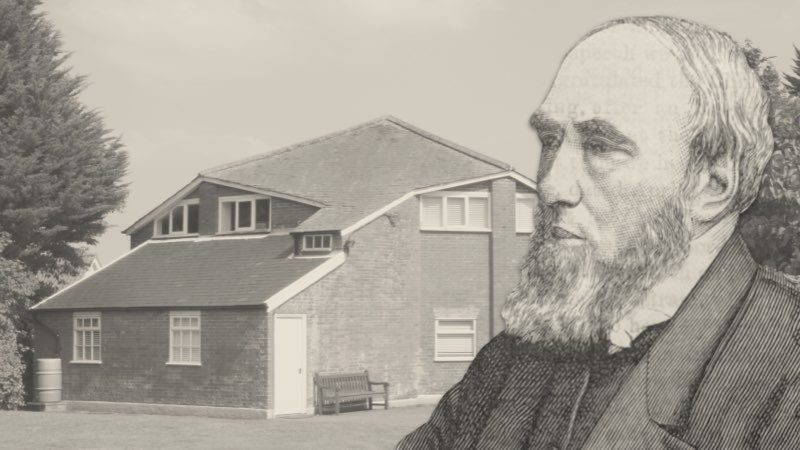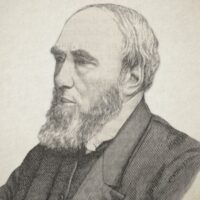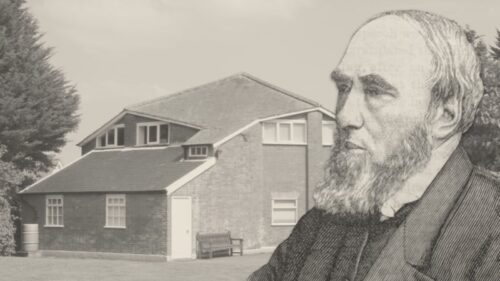
The Life And Death Of William Brown
Earthen Vessel 1888:
The Late Mr. William Brown, Of Friston, Suffolk.
Mr. W. Brown, the oldest of our Suffolk ministers, was called home on Saturday evening, June 9th, at the ripe age of 82, and was buried in the ground of the meeting-house on the following Saturday in the presence of a concourse of fellow-members, friends and others, from far and near, for he was greatly respected and valued. The funeral service was conducted by Mr. S. K. Bland and Mr. W. Large, of Sudbourne,—Mr. Harsant, of Peckham (formerly a member at Friston) engaging in prayer. Mr. Bland preached the funeral sermon on the following day—the quaint old six-sided chapel being packed to excess and overflowing. His text was Job 5:26, “Thou shalt come to thy grave at a full age, like as a shock of corn cometh in in his season.”
At the close, Mr. Bland read the following account of our departed brother:—
Mr. William Brown was born at Benhall, Suffolk, February 19th, 1806, baptized by Mr. Daniel Wilson at Tunstall, Suffolk, February 5th, 1824. While living at Benhall he worked hard in the cause of the Redeemer; preaching on the Lord’s day at Ordford, and on week days in the villages and cottages around.
In the year 1831 he had a call from the Church at Bardwell, and preached his first sermon there September 18th, 1831, and last, November 11th, 1832.
He came to Friston and preached his first sermon here November 18th, 1832, and his last, January 29th, 1888, from the text, 2 Cor. 4, last verse, “While we look not at the things which are seen, but at the things which are not seen: for the things which are seen are temporal; but the things which are not seen are eternal.”
During the long pastorate of 55 years he was abundantly blessed in his labours of love and in winning souls for Christ. He preached in season and out of season—notably during a large part of his ministry indefatigably at the chapel and villages around; spending and being spent for the Lord; living more for others than for himself; putting his feet in other people’s shoes; making their cares and difficulties his own; a helper of many in many ways.
Being a man of energy and purpose he became a land surveyor. This he made subservient to the Master’s work and cause at Friston. He measured and mapped out ten parishes for the Tithe Survey; surveyed part of the Great Eastern Railway; laid down the base line of the Manchester and Birmingham, Wahall and Tamworth railways.
He also applied himself to the study of botany, and obtained a certificate to practice Dr. Coffin’s Botanic System of Medicine, January 28th, 1850, in which he soon distinguished himself. Being eminently successful in his treatment of disease, he was eagerly sought after. In this, also, his life was spent for the Master, giving his time, energy and skill for the good of the bodies of the people, as well as seeking the higher interests of their souls.
Good Friday was the last time he was able to go up to the chapel. He took tea in the chapel with the friends, and was obliged to return home directly after. Although not confined to his room, he was unable to get out all the winter, yet looked forward to fill his place, and used to say he had got his sermon ready and felt a strong desire to preach to his old friends, if only once more. We always found him happy, and he often told us the last year had been the happiest of his life.
An old friend called to see him and said, “Dear brother, how do you feel in your mind?” He said, “I am only waiting;” lifting his hand up, be said, “The path is an untrodden one, but it is all right; it is up there somewhere.”
Mr. Roe, his son-in-law, said to him a few days before he died, “Do you still find Jesus precious?” He replied, “Only waiting His call; it won’t be long now. The last struggle will soon be over. It is all right: my Father holds the helm.”
Mr. Large came to see him the day before he died. He was pleased to see him and said, “My old friend Large, I am glad to see you:” Mr. Large replied, “You will be home first now, dear brother.” He answered, “Yes, bless God; and you will bury me, won’t you?” He was unable to say any more, being exhausted. Feeling his end was near, he took an affectionate farewell of his wife and daughter. Just before his end, Mrs. Brown said, “You are on Jordan’s stormy banks, dear.” He looked up with a gentle smile, but could not speak, and peacefully passed away to the rest that remaineth for the people of God, to be for ever with the Lord.
In the Gospel Herald for July, 1834, occurs the following note:—
On Good Friday, March 28th, Mr. Brown was publicly recognized as pastor of the Baptist Church at Friston, near Saxrnundham, Suffolk. The services were conducted by the following persons:—Mr. Clark, of Saxlingham, Norfolk, reading and prayer; Mr. Collins, of Grundisburgh, stated the reasons of dissent, and described Scriptural constitution of a Gospel Church; Mr. Gowry, of Halesworth, offered ordination prayer; Mr. Wilson, of Tunstall, gave the charge, founded on 1 Cor. 4:2; Mr. Wright, of Beccles, addressed the Church from I Thess. 5:12-14. The meeting-house was crowded to excess, and the prospects of this rising interest are very encouraging.
The Circular Letter of the Suffolk and Norfolk Association, for 1834, gives the annexed interesting notice of the church and pastor of Friston:—
1834.—The congregations here and in the neighbouring villages are remarkably good; the prospects are encouraging, and indications of the Lord’s presence and approbation have been realized. “The fig tree putteth forth her green figs; and the vine with the tender grapes give a goodly smell.” Brother Brown has been ordained pastor, and a friendly harmony has been established between the Church and the Churches with which it originated.
William Brown (1806-1888) was a Strict and Particular Baptist preacher. In 1832, he was appointed pastor of the church meeting at Friston, Suffolk, a position he held for fifty-five years ending with his death.




